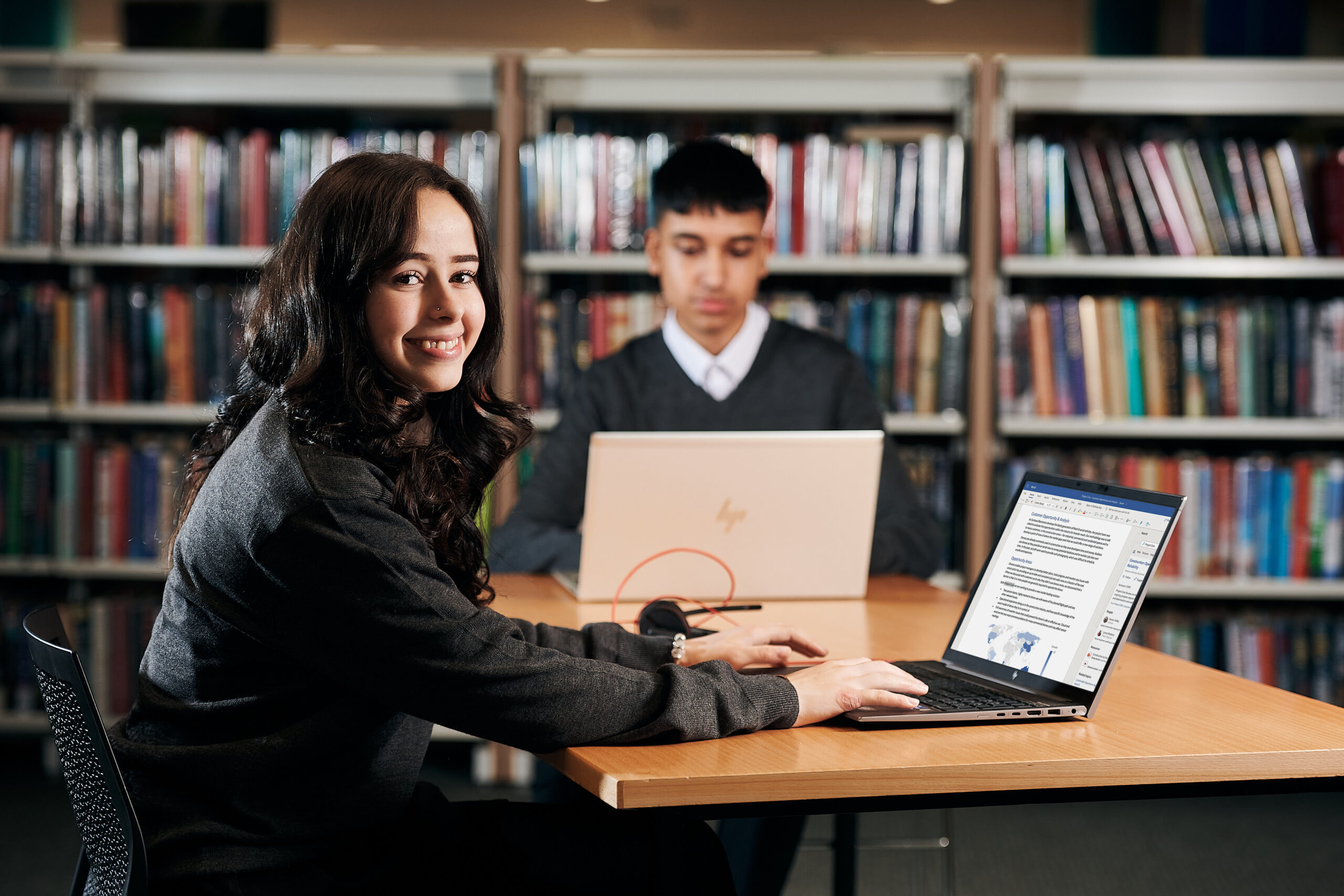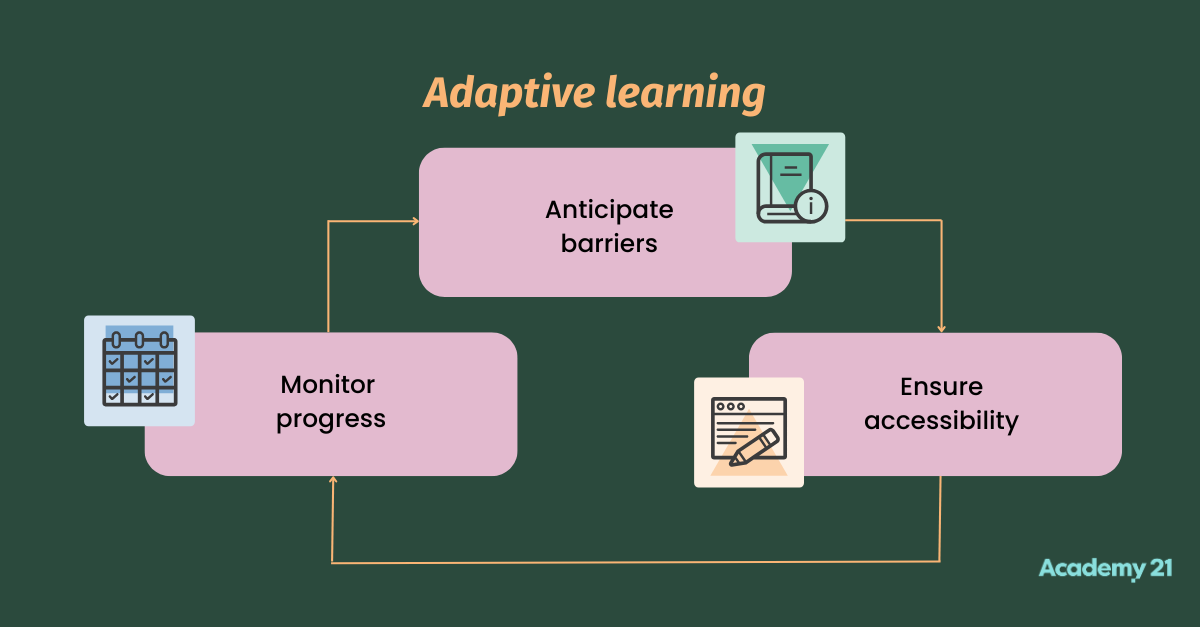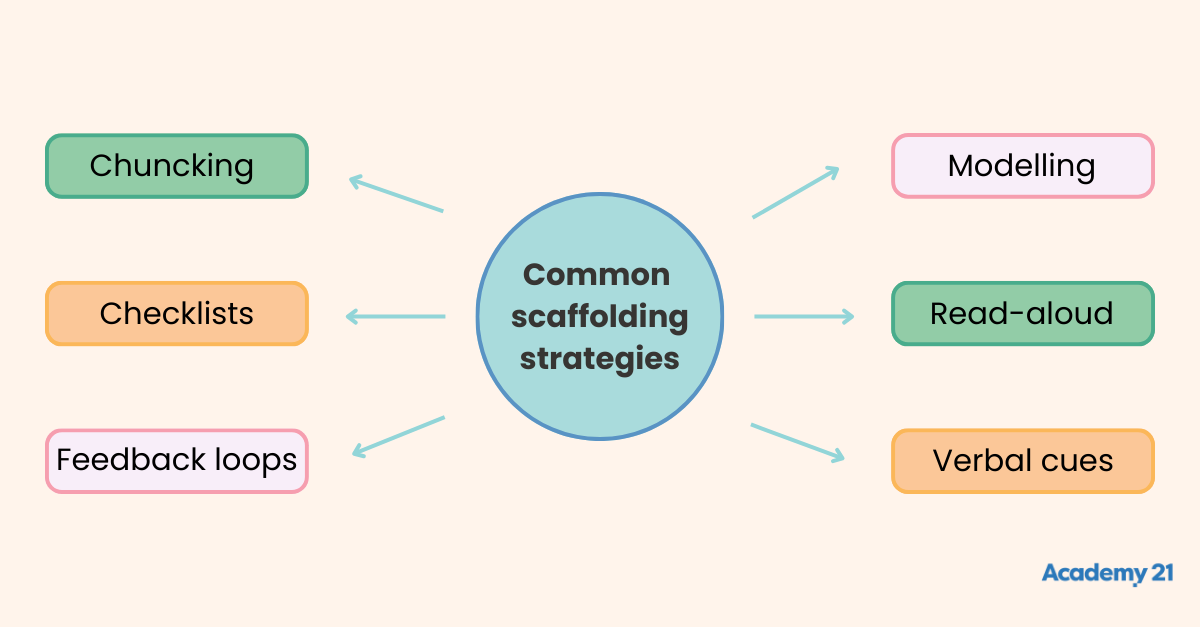Characteristics of effective teaching and learning

We know that teaching is a complex craft. Effective teaching is a nuanced mix of approaches, strategies, and ‘best bets’ that are used in different ways and at various points to enable learners to master what they learn and build confidence and skills.
Online teaching has specific considerations to ensure students can fully engage and thrive in the online classroom. Much of this mirrors what we might see in ‘bricks and mortar’ schools, but remote teaching is also different…
Interest in online teaching has grown over the past few years, as exemplified by research from the Department for Education and Education Endowment Foundation.
As a large online provider, Academy21 has seen, through the thousands of lessons we deliver each year, what is required to deliver phenomenal learning opportunities. As such, teaching at Academy21 rests on key principles: inclusivity, research, and innovation.
What is effective teaching and learning?
Effective teaching and learning involve employing techniques and tools to promote engagement in learning activities that deepen understanding and hone skills. This starts with thinking about how students receive information, be that via listening, reading, or viewing, and moves on to opportunities to apply and reflect on what they have learned.
All these elements matter if we want to foster critical and independent thinking, which builds students into more confident and empowered learners.
Online teaching can amplify effective teaching and learning by fostering flexibility and innovative digital resources and technologies. It can break many barriers schools face when providing a more tailored and targeted education to every student.
So, what are some of the hallmarks of effective teaching online?
Characteristics of effective teaching and learning in the online classroom
Below is an outline of our steps to ensure a quality experience for all learners – these are the ‘best-bet’ priorities we have seen from teaching many students from schools across the country. These work in many contexts and are broadly applicable:
Inclusive and accessible
Inclusivity and accessibility are embedded in everything we do. Our school platform is designed to welcome and help every student navigate their live lessons, assignments, and school events—before they even meet their teacher.
Resources are scaffolded to ensure that all learners can access and understand content and are challenged and stretched, whatever their prior level of learning. We start with the question, ‘Can a student begin learning now?’ Our teachers ask themselves if they have taught and presented activities with enough clarity and access points for the students to engage.
We may offer accessibility tools to those with communication challenges, adapt our delivery style to accommodate those with cognition needs, offer take-up time, or close support in class. Thinking from the student’s perspective is critical. When this is done online, we can deploy many tools to customise learning effectively.
Our delivery modes are varied so that students can contribute, interact and respond to feedback differently depending on their needs. Having varied modes of participation means every child can contribute and grow in confidence, which is critical. We focus on student accessibility, ensuring every child has a manageable starting point. This approach helps them feel confident in their ability to thrive and learn at Academy21, especially if they found this challenging in previous school environments.
It is crucial to have flexible programmes and different means of participation, as well as to think deeply about the ‘start point’ a child needs in the lesson online. Our teaching approach builds confidence, helping students achieve their goals and feel well-prepared to transition smoothly to their following educational setting.

Flexible
Flexibility matters to our schools and the thousands of young people who use our provision. We offer multiple timetable options so our lessons can fit our partner schools’ timetables or students’ needs. We have different groups so students can be placed in the most appropriate class at a suitable time and with their needs in mind. This level of customisation is only possible online and is vital to vulnerable learners.
During the enrolment process, we take the time to understand each student’s needs and commitments, ensuring the programme we offer is tailored to support their success. We ensure students have access to live, adaptive teaching at times that work best for them, allowing them to balance their studies with other activities that contribute positively to their wellbeing.
This flexibility becomes especially valuable when it’s time for student reintegration, as it allows schools to adjust their timetables to accommodate on-site lessons. This is a unique benefit that online education can provide.
Moreover, we enable students to participate in different meaningful ways, ensuring there are rest breaks and that deadlines and tasks can be altered to respond to a student’s situation and keep them motivated. Effective teaching adapts to the needs of each learner. This means understanding different learning needs and ensuring each student succeeds through individualised support.
Our teaching team is well-versed in adaptive teaching, using flexible and adaptable approaches to delivery and task setting to address misconceptions and queries.

Research-informed
Quality educational research is central to our practice at Academy21; it underpins staff development and planning so that the ‘best bets’ in terms of pedagogy and curriculum are incorporated to maximise student success. Sources used include the EEF Teaching and Learning Toolkit, Evidence-Based Education’s Great Teaching Toolkit and Rosenshine’s Principles of Instruction. Much of what works in physical settings has resonance online and applies, especially where the role of the learner is paramount.
However, there are necessarily differences or more ways of doing things online that offer more insights and opportunities. Assessment for Learning is crucial in any lesson, yet many tools can be used online to capture understanding throughout a lesson. Equally, questioning remains vital in any setting, and again, online, there are multiple tools to allow every student to hear and respond in public, privately, and collaboratively.
At Academy21, our teaching team adapts essential pedagogical approaches to the online realm to create a supportive environment that encourages deep thought and learning. Being research-informed and reflective enables us to select and sequence the knowledge and skills we want learners to master, including high-value concepts such as vocabulary acquisition, core knowledge or metacognitive strategies.
For example, research-supported recall practice is embedded in our spiral curriculum, so students revisit core concepts and skills. This is delivered through various low-stakes assessment tools, from which the teacher gains valuable and quick insights into individual and class knowledge that they can use to adapt lessons.
Staff are skilled in scaffolding, a critical teaching method that helps students progress through complex tasks by providing structured support. Online, we can offer personalised scaffolds quickly and repeatedly, allowing students to revisit worked examples as needed on our platform. This helps them process and practice at their own pace.

Engaging and innovative
The pedagogical approaches adopted by our fully qualified online teachers at Academy21 mirror those used by effective teachers in physical settings. Initial hooks, introductions, periodic reviews, and deliberately chosen content contribute to our engaging presentational resources.
Teachers think purposefully about engaging learners in individual and collaborative work whilst keeping students engaged through communication pods, discussions, whiteboard activities, audio and video content, and interactive quizzes.
At Academy21, all our live and adaptive lessons leverage functionalities like chat pods and polls to improve engagement. Indeed, interactivity is vital, and there are myriad ways to do this online via high-quality audiovisual content, augmented reality content, and collaborative planning tools. Online, these functionalities can integrate more seamlessly into the classroom space.
Interactive virtual classroom software facilitates live teaching, which the class teacher fully controls to create a safe learning environment. Our bespoke platform and student hub allow teachers to integrate best-in-class digital resources to leverage the best features of collaborative and independent learning. This includes a multitude of participation tools, editable lesson material, audio-visual content, and interactive resources, as well as both audio and written feedback tools.
Because student work is visible to teachers online in real-time, they can provide quick, targeted feedback. This feedback is easily accessible to the student anytime and is connected to models and other resources available on the platform. Additionally, it’s visible to parents and other stakeholders, ensuring transparency.
Regular feedback is vital to student progress, helping them reflect on their learning and pinpoint areas for improvement. Online learning enhances this process by offering instant, accessible feedback that students can revisit. Teachers provide actionable feedback linked to examples and resources, allowing students to engage with the material more effectively at their own pace. This continuous, interactive feedback is a unique advantage of online learning.
Breakout rooms enable targeted activities and discussions, offering challenges for fast learners or extra support for those needing it. This fosters a personalised, less overwhelming feedback environment—one of the unique benefits of online learning.
Contact us
Contact our team below if you want to learn more about Academy21 or refer a student.



